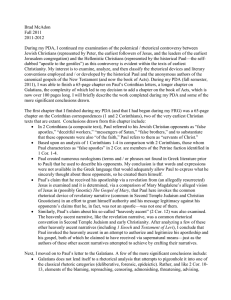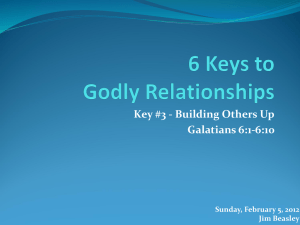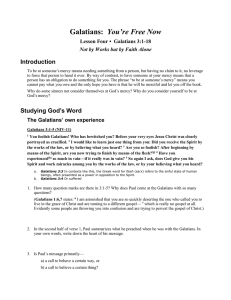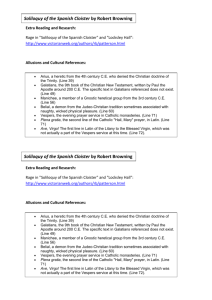Galatians – “Living the True Gospel” Lesson 2: Galatians 1:11
advertisement
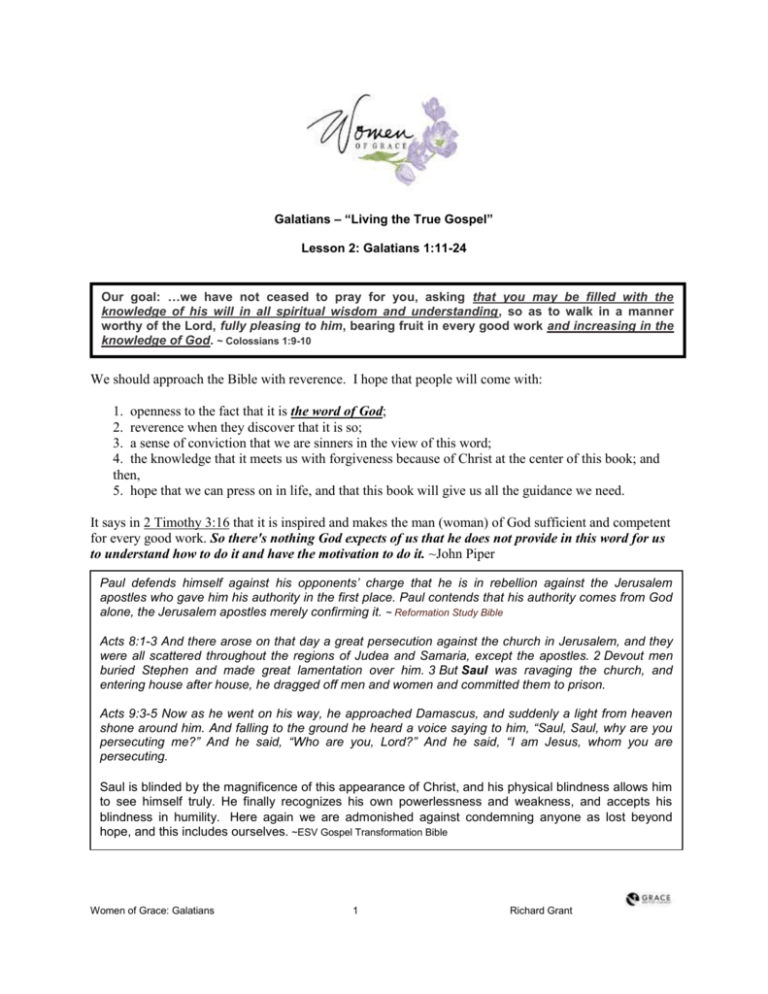
Galatians – “Living the True Gospel” Lesson 2: Galatians 1:11-24 Our goal: …we have not ceased to pray for you, asking that you may be filled with the knowledge of his will in all spiritual wisdom and understanding, so as to walk in a manner worthy of the Lord, fully pleasing to him, bearing fruit in every good work and increasing in the knowledge of God. ~ Colossians 1:9-10 We should approach the Bible with reverence. I hope that people will come with: 1. openness to the fact that it is the word of God; 2. reverence when they discover that it is so; 3. a sense of conviction that we are sinners in the view of this word; 4. the knowledge that it meets us with forgiveness because of Christ at the center of this book; and then, 5. hope that we can press on in life, and that this book will give us all the guidance we need. It says in 2 Timothy 3:16 that it is inspired and makes the man (woman) of God sufficient and competent for every good work. So there's nothing God expects of us that he does not provide in this word for us to understand how to do it and have the motivation to do it. ~John Piper Paul defends himself against his opponents’ charge that he is in rebellion against the Jerusalem apostles who gave him his authority in the first place. Paul contends that his authority comes from God alone, the Jerusalem apostles merely confirming it. ~ Reformation Study Bible Acts 8:1-3 And there arose on that day a great persecution against the church in Jerusalem, and they were all scattered throughout the regions of Judea and Samaria, except the apostles. 2 Devout men buried Stephen and made great lamentation over him. 3 But Saul was ravaging the church, and entering house after house, he dragged off men and women and committed them to prison. Acts 9:3-5 Now as he went on his way, he approached Damascus, and suddenly a light from heaven shone around him. And falling to the ground he heard a voice saying to him, “Saul, Saul, why are you persecuting me?” And he said, “Who are you, Lord?” And he said, “I am Jesus, whom you are persecuting. Saul is blinded by the magnificence of this appearance of Christ, and his physical blindness allows him to see himself truly. He finally recognizes his own powerlessness and weakness, and accepts his blindness in humility. Here again we are admonished against condemning anyone as lost beyond hope, and this includes ourselves. ~ESV Gospel Transformation Bible Women of Grace: Galatians 1 Richard Grant Paul refutes the idea that he came to his gospel message through his own reflection, reasoning and thinking. He recounts that he was "intensely" hostile to the church and to Christianity (v.13) until just before his conversion. There was no evolution of thought through a process of formulation, discussion, presentation, interaction with others, and revision. Paul points out that there was no way that his Christian message was the product of his own line of thinking. Rather, it was the exact, polar opposite of where he had been going. His previous life of overt hostility to the gospel was common knowledge. How then could his Christianity be the product of simply a rational or cultural process? He was so violently opposed to Christ that no one could get near him to “witness” to him; he was so intensely hostile that he did not give anything the Christians said a moment’s reflection. Therefore, his experience is strong evidence that his teaching is via revelation. ~Tim Keller, Galatians Study Guide Acts 9:4 Jesus’ reference to Saul’s (Paul’s) “persecuting me” shows his close identity with his followers: to persecute Christians was to persecute Christ. Acts 22 This is the scandal of the gospel. The Jews treasured their status as God’s people, and found it difficult to accept that God was “grafting in” those from outside their race (see Romans 11:17–24). God’s grace extends to those we assume are beyond his reach, even to those we despise. ~ESV Gospel Transformation Bible We read that Paul realized he was “Called by His grace” and especially “it pleased God…” Despite his terrible record of evil, God does not invite him into a second class situation, but into being a preacher of the gospel. God’s favor is not given in accord with Paul's past but in contradiction to it. That is grace. But even more telling is the second phrase, “it pleased God.” Why did God choose and call Paul? Was it because Paul was pleasing to God? No, it was simply because God was pleased to do so. In other words, God shed his love on Paul not because he was worthy of it, but simply because God took delight or pleasure in doing so. ~Tim Keller, Galatians Study Guide v.16 “I did not immediately consult with anyone”. Paul did, of course, meet with Ananias three days after his conversion (Acts 9:10–19; 22:12–16). The word translated “consult,” however, suggests laying something before someone or submitting it for comment and approval. Paul certainly did not consult Ananias in this sense. Ananias’s role was to confirm Paul’s calling to preach to the Gentiles and to baptize him. Paul stresses that his call to preach to the Gentiles came from God and not from the leaders of the Jerusalem church. ~ Reformation Study Bible This account tells (the Galatians) that he has already spent years seeking to live according to the Jewish customs and traditions. He says that he had beaten out almost every one of his own generation ("of my own age" v.14) at being zealous for moral righteousness (v.14). And yet it had not made him “right with God.” …Later we will see that they were encouraging the Gentile Christians to become full converts to Judaism, assuming all the Mosaic laws of diet and dress, including circumcision (Gal 2:12, 3:5, 6:12). But Paul's account, says: "I've already been there! I've already done that! I know all about this subject! You cannot make yourself acceptable to God by the most zealous and fastidious compliance to moral, ethical, cultural codes." ~Tim Keller, Galatians Study Guide Commentary compiled by Cheryl Ernst Women of Grace: Galatians 2 Richard Grant 1. What did you apply from the last lesson? 2. Read through the book of Galatians at least once this week. Read through chapter 1:11-24 every day. 3. What did you learn from the commentary portion of this lesson? 4. What words in this passage stood out to you? 5. Which verse do you think is the focus of this passage? 6. The Galatians 1:6 Paul accuses the Galatians of following a “different gospel”. Using Galatians 4:9-11, Galatians 5:2-6 and Galatians 6:12 describe what is different about this “different gospel” and about those who teach it. 7. In Galatians 1:13 Paul writes “For you have heard of my former manner of life…” Read Acts 8:1–3 and Act 9:1–3. Describe Saul’s “former manner of life”, his mindset and mission regarding the Christ-followers he encountered. What was he intending to do in Damascus? Women of Grace: Galatians 3 Richard Grant 8. Acts 9:3–9 describes how Saul came to believe in Jesus. What stands out to you in this passage? Briefly describe how you came to believe in Jesus. 9. In Galatians 1:15-19 Paul emphases that after believing he did not immediately consult with others, but first spent 3 years in the desert of Arabia and then later went to meet some of the other apostles. Sometimes Christians say they have had a “Desert Experience”. Have you heard this expression? Have you had a “Desert Experience”? 10. In what way can you pray for yourself and others in light of this passage? Women of Grace: Galatians 4 Richard Grant

